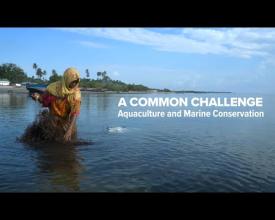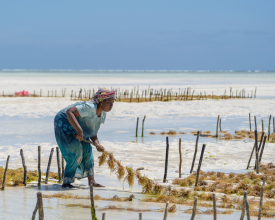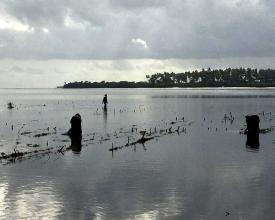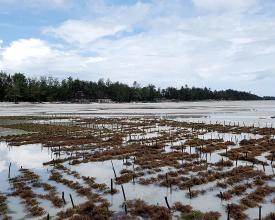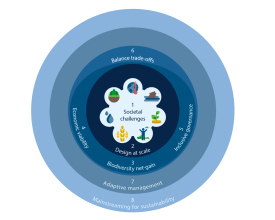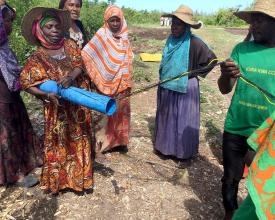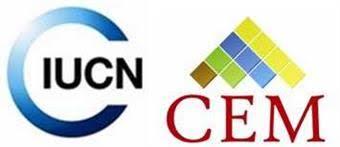
Seaweed farming in Zanzibar: addressing the common challenge of aquaculture and marine conservation
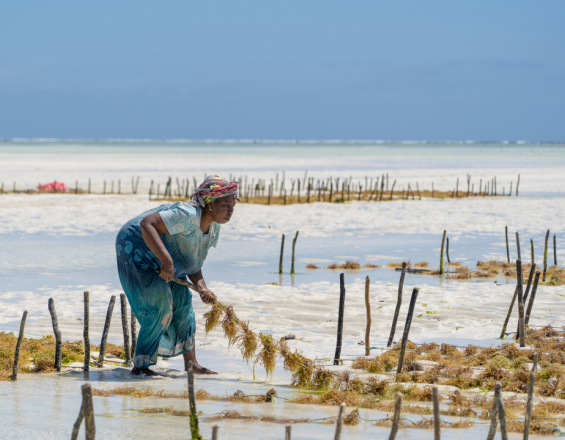
Since 1990, Zanzibar has become a primary seaweed producer in Africa. Seaweed farming activities are usually small-scale and carried out in the intertidal zones largely in marine conservation areas, near mangroves and coral reefs. Eighty-eight per cent of seaweed farmers are women, making this an important activity to elevate their economic status and role in the community. New approaches to aquaculture and marine conservation have emerged only recently (in terms of concrete projects since 2014), with the case in Zanzibar serving as a first attempt to test the level of adherence of seaweed farming with the IUCN Global Standard for Nature-based Solutionsᵀᴹ.
Context
Challenges addressed
Local communities, and especially seaweed farmers, many of whom are women, face a number of environmental, social and economic challenges. These include climate change, weak representation of women producers, difficulties in accessing international markets and insufficient protection of coastal ecosystems. In response, an integrated coastal management approach and blue economy strategy are applied in Zanzibar. They aim to protect coastal ecosystems and habitats, enhance artisanal fisheries and mariculture. However, shortcomings in the management remain.
Location
Process
Summary of the process
The building blocks highlight a number of key insights that emerged from the assessment of seaweed farming in Zanzibar against the criteria and indicators of the IUCN Global Standard for Nature-based Solutionsᵀᴹ. The co-management approach and inclusion of women in particular was considered a strength of the intervention. However, it fell short in a number of other other areas for which corrective actions need to be taken. While the building blocks do not give a full picture of what can be considered a Nature-based Solution as they do not go into details on all criteria of the Standard, they illustrate how the Standard can be used as a tool to assess the design, implementation and current status of an intervention and whether it can be considered a Nature-based Solution. The assessment was particularly useful in helping to identify additional information and data needs to strengthen the intervention.
Building Blocks
Co-management approaches and women empowerment
Co-management approaches were applied in marine conservation areas. These involved the government, local communities, seaweed farmers, NGOs and associations, often with international support. A particular feature was the inclusion, empowerment and support of women, considering their role as primary seaweed farmers and beneficiaries. The cooperation generated between different actors has not only demonstrated the willingness of the Revolutionary Government of Zanzibar to implement blue growth strategies that are inclusive of local communities and aim to build a sustainable future, but also enabled the ongoing revision of management plans for marine protected areas in Zanzibar. The need to improve the participation of women and aquaculture farmers in decision-making, to increase transparency and to provide access to information, was highlighted. There are also opportunities to enhance cooperation across jurisdictional boundaries.
Enabling factors
Several studies provided insights into the positive outcomes of mariculture and seaweed farming, which included gender equality, economic revenues provided to women and the consequences on their life, including increased autonomy, empowerment and role in the communities. Moreover, the Revolutionary Government of Zanzibar put in place a blue growth strategy (see the Zanzibar Blue Economy Policy), which considers the challenges of seaweed farming, including related sustainability concerns.
Lesson learned
A new agenda of research and development work has emerged, including dialogues around Nature-based Solution criteria and indicators with stakeholders in Zanzibar and local communities. This could contribute to a future roadmap for Zanzibar and a framework for regular self-evaluation. New management plans for marine protected areas are already under way and the Revolutionary Government of Zanzibar plans to support seaweed farming activities in deeper waters by equipping women groups with fiberglass boats. It would be important to assess such new developments against the IUCN Global Standard for Nature-based Solutionsᵀᴹ criteria to determine how changes to the management of marine protected areas may affect adherence with the Standard.
Resources
Defining priority and corrective actions to strengthen the intervention
During the implementation of the intervention, the project team conducted the self-assessment that helps determine whether an intervention is in adherence with the IUCN Global Standard for Nature-based Solutionsᵀᴹ. The assessment provided information about the intervention’s strengths and weaknesses and helped derive concrete recommendations and corrective actions for future interventions. Two criteria were deemed insufficient. Criterion 3 (biodiversity net-gain) fell short, because the analysis of the biodiversity benefits achieved through this intervention were largely based on a desk review of existing literature and information rather than a specific assessment, monitoring framework or thorough and collective effort with key informants and stakeholders. Criterion 6 (balancing of trade-offs) was also deemed insufficiently addressed. While there was a reported willingness from the Revolutionary Government of Zanzibar to consider relevant trade-offs, the limits of these trade-offs and associated safeguards were not clarified. In addition, while provisions on the rights, usage of and access to marine and coastal resources for mariculture are in place, further information on how this is applied in practice is required.
Enabling factors
The assessment was supported by IUCN expert reviewers, who supported the team with the completion of the self-assessment and provided clarification on specific criteria and indicators. Several rounds of discussions revealed that the criteria were sometimes understood and interpreted differently by different people, impacting the assigned rating. This demonstrated the complexities associated with assessing whether an intervention can be considered a Nature-based Solution and the need for thorough and guided consideration of each indicator.
Lesson learned
The IUCN Global Standard for Nature-based Solutionsᵀᴹ served as an important tool to reflect on design, implementation and monitoring challenges related to aquaculture and seaweed farming approaches applied in the IUCN AquaCoCo Project. It provided insights into areas that require corrective action, the collection of additional evidence and means of verification and involvement of local stakeholders, in particular women. In this manner, the self-assessment results will inform future work on aquaculture and seaweed farming in Zanzibar (and elsewhere) and help improve intervention design, implementation and monitoring frameworks.
Impacts
This case study is currently not in adherence with the IUCN Global Standard for Nature-based Solutionsᵀᴹ as it falls short in two criteria, namely criteria 3 (biodiversity net gain) and 6 (balancing trade-offs). It should also be noted that the self-assessment was carried out as a desk review towards the end of the IUCN AquaCoCo project. Further, means of verification were not always available, as data relating to certain indicators were not gathered. To conduct a more comprehensive assessment, local stakeholders should be involved as key informants. Nevertheless, the self-assessment provided insights into areas for improvement as to how interventions are designed, implemented and monitored. It also provided insights into knowledge and data gaps, which prompted critical questions and corrective actions that need to be addressed going forward.
Beneficiaries
seaweed farmers (88% are women), coastal communities, rural women fishers, tourism sector
Sustainable Development Goals
Story
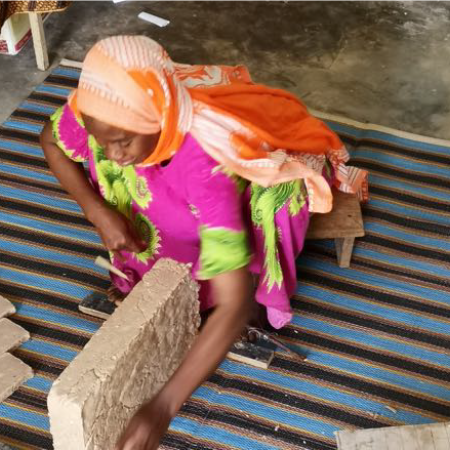
Seaweed farming provides cash income for many women of local communities in Zanzibar. Usually, seaweed harvested in Zanzibar is dried and exported to various parts of the world which used seaweed for pharmaceutical products and in the cosmetics industry. This woman is producing artisanal soap made of seaweed that she will sell on local markets and direct sales into resorts to tourists visiting the archipelago. This exploration of the development of local value chains is quite inspiring and can generate more direct incomes for them. Other attempts to diversify the revenues from seaweed farming are made to propose field visits of mariculture sites within the marine and conserved areas in Zanzibar to tourists.
Mwanaisha Makami, seaweed farmer (traditional peg and rope, off-bottom technique) and processor: “I am currently a member of the Seaweed Cluster Initiative. I started farming immediately after I left school, and processing in 2012. I dry and grind seaweed for making soaps, creams etc. It is a good business that brings income. We have a local market as well as a tourist market. I use the money to pay for the school fees and a house. It doesn’t depend on anybody. We need to encourage the young generation [to do it]”.
